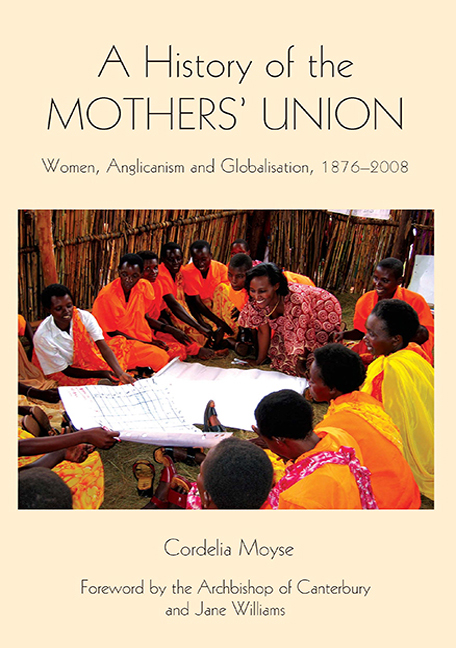Book contents
- Frontmatter
- Contents
- Dedication
- List of Illustrations
- Foreword by the Archbishop of Canterbury and Jane Williams
- Acknowledgements
- Abbreviations
- Introduction
- Part I 1876–1909
- Part II 1910–1944
- Part III 1945–1974
- Part IV 1975–2008
- Conclusion
- Appendix 1 Text of early membership cards
- Appendix 2 Development of the Mothers' Union prayer
- Appendix 3 Midday prayers (original)
- Appendix 4 Development of the objects
- Appendix 5 Biographical notes on central and worldwide presidents
- Bibliography
- Index
- Miscellaneous Endmatter
- Frontmatter
- Contents
- Dedication
- List of Illustrations
- Foreword by the Archbishop of Canterbury and Jane Williams
- Acknowledgements
- Abbreviations
- Introduction
- Part I 1876–1909
- Part II 1910–1944
- Part III 1945–1974
- Part IV 1975–2008
- Conclusion
- Appendix 1 Text of early membership cards
- Appendix 2 Development of the Mothers' Union prayer
- Appendix 3 Midday prayers (original)
- Appendix 4 Development of the objects
- Appendix 5 Biographical notes on central and worldwide presidents
- Bibliography
- Index
- Miscellaneous Endmatter
Summary
The Mothers’ Union, now well into its second century, enjoys an unprecedented longevity and popularity for an international, voluntary, mass membership organisation. Within the Church of England, the Church of England's Men's Society collapsed decades ago and the Girls’ Friendly Society, although operating in 23 countries, has 40 parish branches in England and Wales, making it largely invisible and unknown within the Church of England. Further afield the Union of Catholic Mothers and the Catholic Women's League have almost disappeared. The only secular society to which the Mothers’ Union could be compared is the National Federation of Women's Institutes (WI), but that is a mere youngster having started in 1915. While the WI is the largest women's organisation in England today with over 215,000 members, this is a steep fall from the 500,000 of its heyday in the 1970s. Furthermore it is institutionally unlike MU. The WI is part of a federated organisation, the Associated Country Women of the World, and does not reap the benefits of the same intimate relationship between British and overseas members as the MU.
Since 1876 the MU has grown from a meeting in a Hampshire rectory living room to a membership of some 4 million which spans the globe. Every week it provides millions of women with spiritual fellowship and practical support in their domestic lives, as well as the conviction that their lives and those of their families can be improved by grassroots action and changes in public policy. In order to tell something of this immense and complex story the main concern of this book is the identity and mission of the organisation which they have joined. This account of the development of an institution has been situated against the background of the immense ecclesial, economic, geo-political and social changes which have impacted on MU members as both women and as church women. At a time when MU members, like all members of Anglican Churches, enter uncharted territory following the 2008 Lambeth Conference, it is good to evaluate the success and failure of the largest organisation of women committed to supporting marriage and family life, and their contribution to church life within the Anglican Communion.
- Type
- Chapter
- Information
- A History of the Mothers' UnionWomen, Anglicanism and Globalisation, 1876–2008, pp. 245 - 252Publisher: Boydell & BrewerPrint publication year: 2009



